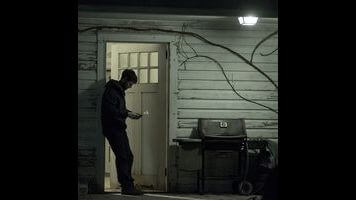Outcast buckles a bit under its “demon of the week” format

From the get-go, Outcast has taken a risk in balancing weekly episodic storytelling with something more serialized and slow-burning. For every visceral, immediate moment from the first two episodes, there are many more that will only make sense once the whole picture of Kyle Barnes’ life, and the supernatural space that Rome occupies, comes into focus. Those first two episodes largely succeed because of the balancing act. Those episode reveal just enough of the larger mystery of Barnes and Rome—there’s Barnes’ estranged family, his previously-possessed mother, potentially free-roaming demons, and a strange man in a black hat that may very well be walking Death—while also crafting tight hour-long episodes that can, relatively speaking, be enjoyed on their own. With “All Alone Now,” the cracks start to show.
It’s tricky to hold both serialized and episodic intentions in mind. It means that the focus of the narrative is shifting from one episode to the next even as the story of Kyle Barnes remains the throughline. In that sense, any episode in the season can be hindered by a lackluster “demon of the week.” That’s the trouble this week, as Reverend Anderson and Kyle Barnes travel to a prison in order to try and exorcise a demon from a former cop who suddenly went off the rails and murdered his partner’s wife.
The biggest problem with the “demon of the week” structuring is—and this is the case with many procedurals—that there’s little to no backstory informing the episode’s plot. Instead, Outcast just throws us into the mix with a cold open, using a disturbing and shocking scene of violence and suggested sexual assault to kick off another buddy-exorcism from Barnes and Anderson. Admittedly, the opening scene is effective. Atticus Ross’ score hums alongside unidentifiable machinery, soon revealed as the gears setting up pins in a bowling alley, and it builds to a fever pitch as Blake Morrow snaps and murders his partner’s wife in her own home. As effective as the smaller elements are, from the framing to the score, the scene itself is painted in broad strokes. It’s difficult for the violence to feel anything more than manipulative when we know so little about the characters. These cold opens can certainly work to establish tone and atmosphere, but they’re only truly effective when they’re tied into the story of Kyle Barnes, as in the series premiere.
“All Alone Now” doesn’t do a whole lot to further dig into what’s happening to Kyle Barnes and why he’s be drawn into some sort of supernatural uprising, and the series’ momentum suffers because of it. When he and Anderson are called to a prison to try and figure out what happened to Blake Morrow, there’s the potential to reveal a little more mythology, or at least use the subsequent scenes to deepen the characterization of Anderson and Barnes. Instead, “All Alone Now” plods along, really only underlining things we already know. So, when Blake gargles on Barnes’ blood, or calls him an “outcast” and says that there’s no stopping what’s happening to him and the people around him, there’s not much in terms of new information in the moments. That leaves “All Alone Now” feeling rather listless, and further removed from the season-long narrative than it should be.
That said, the character dynamics continue to be one of the more fascinating aspects of Outcast. Hell, even Reverend Anderson recognizes that him and Kyle are part of some strange cosmic joke that’s brought them together. “Jesus likes the buddy system” he says after Kyle fails to comprehend the scripture Anderson recites during their road trip. There’s an intriguing dynamic between Barnes and Anderson that’s teased out through all of “All Alone Now.” As the exorcism of Blake proves to be unsuccessful, the scenes become more about the relationship between Anderson and Barnes than actually ridding Blake of his demon. There’s a push and pull between the needs and wants of the two men. Anderson has dedicated his life to chasing down demons, and it cost him his family. Barnes didn’t make such a choice, but a larger force has roped him in anyways, costing him his family as well. So, there’s tension between Barnes and Anderson because the latter believes he has a higher purpose while the former is a reluctant passenger, a man just looking to get his life back to some semblance of normality. That’s an interesting tension that could keep things compelling even if the weekly demon causes the plot to sag.
“All Alone Now” wastes too much time hitting the same beats of previous episodes. Mark wanting to investigate the dead-animal crime scene, the man in black ominously shaving, the demon in Blake teasing Kyle’s inevitable demise: these are all repetitious beats. That leaves the episode feeling like a bit of a pause before more action gets underway. After all, there’s the tease of plenty more to come, from a figure in Megan’s past who may have sexually assaulted her—there’s a lot of that in this episode, and Outcast needs to be careful about getting too exploitative with its violence towards women—to the fingernail found in that abandoned trailer in the woods. Answers may be on their way, but “All Alone Now” spends a little too much time asking the same questions.
Stray observations
- An intriguing emerging theme is the idea of wanting to find a reason for inexplicable acts of violence. It’s the thematic weight in the otherwise lackluster murder subplot. Here’s hoping the show digs into it a little more each week.
- Not the subtlest of reveals, but it looks like the man in black is getting closer to Barnes, killing his neighbor Norville.
- Ross’s score is particularly haunting during the scene that cuts between Megan sneaking around the hotel room occupied by Donnie (played by Scott Porter) and Mark exploring the crime scene in the woods.